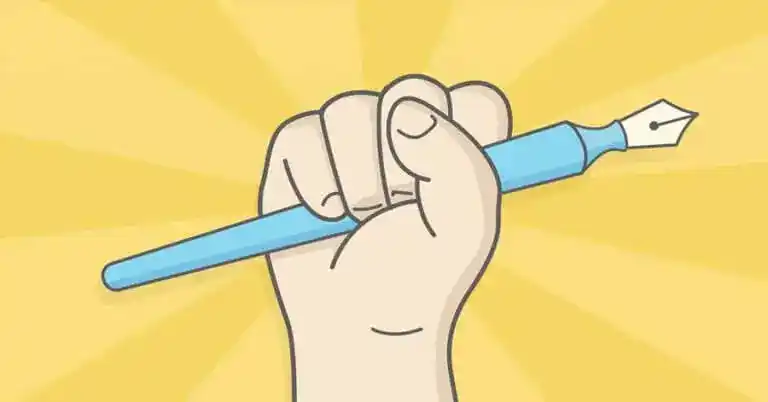Blog •
Last updated on Nov 07, 2023
Working in Publishing: An Insider’s Guide
About the author
Reedsy's editorial team is a diverse group of industry experts devoted to helping authors write and publish beautiful books.
More about the Reedsy Editorial Team →Linnea Gradin
The editor-in-chief of the Reedsy Freelancer blog, Linnea is a writer and marketer with a degree from the University of Cambridge. Her focus is to provide aspiring editors and book designers with the resources to further their careers.
View profile →This article was written in collaboration with publishing professionals Alice Sullivan, Alyssa Matesic, Rebecca Heyman, Dominic Wakeford, Mary-Theresa Hussey, Marie O’Shepherd, Andy Meaden, and Nancy Tan.
Working in publishing is the dream job for many: what’s not to like about helping authors realize their vision and share their stories with the world? It’s a creative and exciting industry filled with people who are passionate about books and storytelling. But how do you get into publishing and what is it actually like having a publishing career?
Here at Reedsy, we help connect over 1,000,000 authors with some of the publishing industry’s top professionals, so we’ve contacted our network to give you an inside look at publishing careers, complete with some sweet tips on how you can thrive in this industry!
Preparing for a career in publishing
Many people romanticize the idea of working in publishing but forget that it is, to a large extent, an office job like many others, with various people with very different job titles contributing to the success of a single book. So, before you dive headfirst into applications, it’s a good idea to find out as much as you can about the publishing industry.
Research different publishing roles
Publishing is a multifaceted industry with more career prospects than most people think: beyond editing, book cover design, and marketing there are also people in charge of production, a legal department for contracts and (foreign) rights acquisition, a sales department, and a publicity team, to name just a few cogs in the wheel. Not to mention literary agents who may technically work outside of publishing houses, but who are essential middlemen between authors and publishers and very much a part of what makes the industry turn.
So before you do anything else, it’s a good idea to start thinking about where you see yourself in the future and what types of tasks you think you’d enjoy doing. Then, you can look into what type of qualifications you need in order to get there.
What qualifications do you need to work in publishing?
There are no specific prerequisites for entering the world of publishing that apply across the board, but depending on which field you want to go in (editing, designing, marketing, etc.), there are a couple of qualifications and prior experiences that might give you an edge.
Even though most employers will say they have no specific qualifications in job postings, big publishing houses tend to favor applicants with at least a bachelor’s degree in relevant fields or professional diplomas. (Note that the list below is not exhaustive.)
|
Editorial ✍ |
Design 🎨 |
Marketing 🚀 |
|
|
|
Which prior experience is useful?
As with every job application, having some relevant experience will always add points to your resumé. For example, those who were previously booksellers, review bloggers, or librarians may have an advantage because they are familiar with the latest titles, book trends, and reader preferences. This knowledge can strengthen their cover letter and performance in job interviews for market-facing positions.

📚 Get a headstart on your publishing career by learning about reader behavior as a librarian or bookstore clerk. That’s how Hunger Games editor Jennifer Rees got her start. You can check out her story in this webinar.
In addition, it’s often a strong asset if you have administrative experience when applying for entry level positions, as most roles in publishing are office jobs, full of paperwork that needs sorting and email inboxes that need attending.
Of course, you may have other previous experience that can prove helpful to a career in publishing too, depending on the department you’re interested in joining. A legal degree won’t hurt if you’re hoping to get into contracts and rights acquisition, for instance, and maybe your time peddling Girl Scout cookies will come in handy if you’re dreaming about a career in sales.
Q: What skills and experiences do you consider essential for someone looking to secure a job in book publishing today?
Suggested answer
Entry level roles in publishing are few and far between, which can make it even harder for someone who is trying to break into the industry.
It isn't helpful to say that you love to read in either your cover letter or resume--everyone working in publishing loves to read. What you need to be able to articulate is why you would be a good fit for whatever role you're applying to. What skills do you have, what different ways of thinking could you bring to the table, how will your work help the company move forward.
I would also recommend for anyone trying to get into publishing to apply to as many roles as you can and take whatever opportunity is allotted to you. My own career started as a marketing intern, which I later transitioned to a fulltime role within the editorial department. You don't have to start in editorial to end your career there. Once you're in-house, you can develop your own niche and move around internally. But you can't do that if you don't apply for that role in the first place!
Matt is available to hire on Reedsy ⏺
Getting a job in book publishing can feel like an impossible task. Creative thinking and a bit of research will help get a foot in the door.
In the current cultural landscape, the most vital skill anyone can have is adaptability. Everything in our society is changing at breakneck speed, and publishing is no exception. A candidate that has the ability to problem solve quickly and provide creative solutions will be invaluable.
Having said that, there are a few concrete skills that put any job seeker at the head of the pack. These are:
Comfort with numbers
Old school publishing folk are often proud of their lack of business acumen. It’s a creative industry, they will say. But at its heart it is still a business. The more a candidate knows about how a P&L works and what is included in a royalty statement, the better off they will be. Information on these can be found on various websites, including The Authors Guild and literary agents associations.
Social media acumen
Believe it or not, a lot of publishing houses and agencies do not understand social media. They know, for example, TikTok has a lot of influence, but most publishers don’t understand how it works or how best to utilize it. This is a huge advantage new people to the industry have. Publishing is, at its heart, very slow to adapt. It’s been having a discussion about social media for almost 20 years now, and still hasn’t figured it out. There is an opportunity for new applicants to shine here.
Open-mindedness
Be open to the kinds of jobs that are available in publishing. The most popular jobs will always be in editorial, because that is the position with the most glamorous reputatin. But within any given company there are other vital positions that won’t have as many applicants. These are sales jobs, production and design marketing and publicity, and rights positions. Each one is a learning opportunity that also provides a foot in the door of an industry that is notoriously hard to navigate.
It is true a lot of jobs in publishing are competitive. Each candidate comes with a lot of valuable skills any industry would be interested in. It isn’t a matter of whether someone could do the job. It’s the little gaps that a good candidate can fill, and the initiative that candidate has shown by doing preparation ahead of time.
Lara is available to hire on Reedsy ⏺
Getting your foot in the door
With your CV, experiences, and an idea of what types of roles are available in publishing, you can start looking for jobs that fit your profile. Broadly speaking, there are two paths you can take: you can find a job at a publishing house, or start working freelance.
Finding in-house positions
Within the traditional publishing route, you have a couple of options. The most well-known employers are Big 5 publishers like Random House or Penguin (now merged under the same umbrella), who usually have openings for interns and editorial assistant jobs throughout the year. Go for these to get a chance to work on high-profile projects in big cities like NYC or London. On the flip side, you’ll be running up against a lot of competition and interns are often relegated to menial tasks like sealing envelopes or shredding confidential documents. If you’re lucky, you may get to read the slush pile — a great learning opportunity and chance to build up the hard and soft skills of editing, according to Hunger Games editor Jennifer Rees — and your work will mainly be focused on one specific aspect of the publishing process — marketing interns are unlikely to step far outside the marketing department, and so on.
Alternatively, you can apply to internships or entry positions at small presses or independent publishers. They operate in more tight-knit teams, so there are often fewer vacancies, but the experience is just as rewarding and you often get to have a more hands-on experience with several aspects of the publishing process, from unrevised manuscript to finished product.
💡 Top tip: remember to always research the profile of the publishing house you’re submitting your application to. If their specialty is non-fiction but you express a passion for sci-fi in your cover letter, you’re unlikely to get hired. Always personalize your application and show that you understand their catalog.
We recommend keeping an eye out for job opportunities at all kinds of publishers (and even outside of publishing) because there’s no guarantee that your application will get accepted right away. On the journey to getting her first official publishing job, editor-turned-ghostwriter Alice Sullivan says:
“I sent out between 50-80 resumes after graduating college and got a few part-time jobs: I worked the night shift at the sports desk at a local paper, got a six-week gig at a children's press, and wrote for a few home and gardening magazines. Then, I was finally hired by a local publishing house as a freelancer; they brought me on as a full-time editorial assistant a few months later.”
Graduates wanting to go into design and marketing may have an equally hard time, since a strong portfolio as evidence of your ability (e.g. graphic design skills, social media management) is a particularly important criterion. When starting out, try to be flexible about what job you go for, look a bit outside of the publishing box to build a relevant resume, and don’t give up after the first rejection.

Be prepared for grunt-work
Getting that entry-level job doesn’t mean you’ll get to dive into your preferred line of work right away. People are busy, and it’s often no one’s priority to advance your career but your own. Thriller and historical fiction editor Alyssa Matesic says that admin will be your primary responsibility at first, and it will take active effort to gather any work experience beyond that:
“You may have to be proactive and ask editors you work with if you can take a look at their submissions or their in-progress manuscripts. Editors generally love having second sets of eyes and ears, so they’ll likely be happy to share and get your opinions. Make it part of your job to find time to read and discuss your colleagues' manuscripts.”
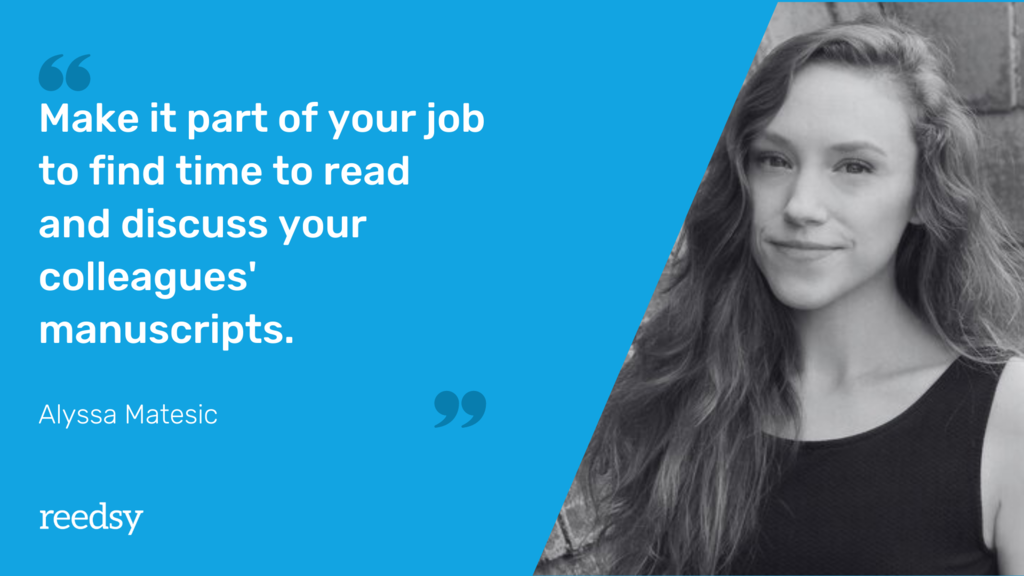 For design and marketing paths, junior workers are often delegated smaller tasks, while senior employers lead brainstorming sessions and creative meetings. Again, it pays to put yourself out there by suggesting ideas or taking on any new responsibilities that arise.
For design and marketing paths, junior workers are often delegated smaller tasks, while senior employers lead brainstorming sessions and creative meetings. Again, it pays to put yourself out there by suggesting ideas or taking on any new responsibilities that arise.
Unfortunately, all this means working overtime is often expected — and it doesn’t just apply to newcomers. Many professionals are encouraging more open discourse about the disparity between workload and wage, but changes won’t happen overnight. It’s still safer to be prepared for packed schedules.
Starting as a freelancer
Another option for beginning your publishing career is to work for yourself. Rebecca Heyman, whose impressive editing career started with freelancing in 2009, proves that success can be found outside the system. With her degree in English and American Literature, Rebecca got her first editing gigs on Elance (Upwork’s predecessor). She quickly became their top professional in the editing category and was able to focus on fiction books while also expanding her reach. For her, social media and networking were key.
“The online world was smaller back in the early aughts, so Twitter was an easier place to navigate. I found and interacted with writers there, worked with some of them, and word-of-mouth took care of the rest.”
As you can see, this relies a lot on self-marketing and networking. Rebecca acknowledges that “there's a huge number of resources available today that makes starting your own business more accessible than ever,” but with a lot more noise on the internet nowadays, you will have to be proactive, creative, and persistent to start from scratch as a freelancer. 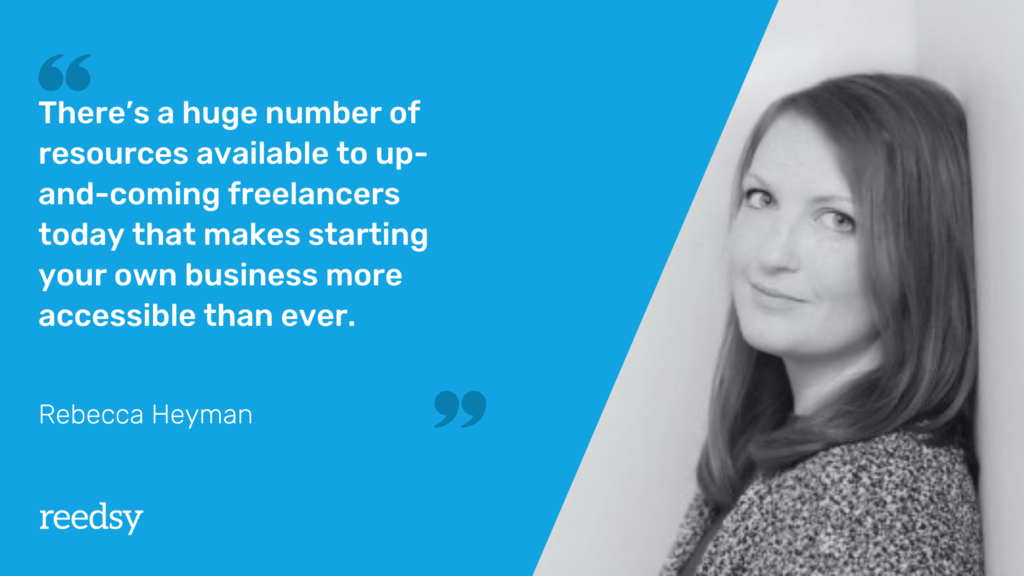
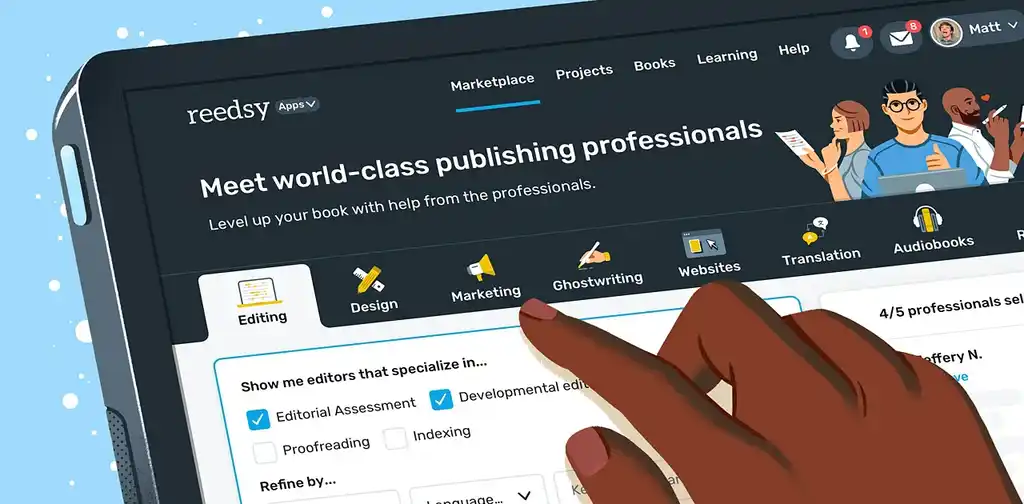
JOIN OUR NETWORK
Supercharge your freelance career
Find projects, set your own rates, and get free resources for growing your business.
Q: What have been the biggest challenges and rewards of freelancing compared to working in-house?
Suggested answer
I found my first in-house translation job—whether by luck or sheer stubbornness, I’m not sure.
In Spain, as in many other countries, in-house opportunities for translators are scarce, but I didn’t feel ready to start my own business. So, I sent out thousands of CVs. When I got no response, I decided to show up at companies in person and ask if they had had the chance to read my cover letter. That was many years ago, but even then, it was just as unusual as it is today. The expressions on the faces of the employees who opened the door were priceless. But someone found my boldness amusing and gave me a chance.
That job lasted two years, until the financial incentives for hiring women under 30 ran out (but that’s another story). At that point, I knew I couldn’t rely on the same approach—I had to take the leap and go freelance.
And it was tough...
The first challenges were dealing with the bureaucracy of registering as self-employed, paying social security fees when I had no income yet, making my first investments (mainly translation software), getting my name out there, finding clients, and keeping them.
For a year, I had to combine freelancing with a telemarketing job just to cover my expenses. But things worked out. For many years, I worked with two major translation agencies that provided me with a steady workload, alongside editorial projects and occasional clients.
Beyond the financial aspect, freelancers have a lot to juggle—legal paperwork (which is best left to an accountant), IT issues, client relationships, time management, multitasking, and, crucially, financial management and marketing.
In my case, handling software, learning new tools, researching translation resources, and managing my finances always came naturally. However, I failed to recognise the importance of visibility—of making myself known. I got too comfortable working in the shadow, with those two agencies, always accepting their conditions. It came back to bite me.
That was a big mistake. Thankfully, I’ve since corrected it, and I must say that networking has brought me new professional opportunities and invaluable personal experiences I never imagined.
In conclusion, freelancing is a journey—one that shapes you both personally and professionally. Unlike in-house translators, who have the security of a stable salary and structured work, freelancers trade that certainty for a world of possibilities—some of which materialise, while others don’t. It’s a path that forces you to develop a wide range of skills and to embrace constant uncertainty. Over the years, I’ve come to appreciate the value of this learning process and just how versatile we can become.
There are only two essential requirements: being professional and being willing to give it your all. The rest, you build along the way.
Inma is available to hire on Reedsy ⏺
I worked in house for major publishers for many years, and it had a huge range of benefits, including the friends I made, having a place to go, and of course, the literal benefits. But I also always had this feeling like, “sitting at a desk for 8 hours a day just isn’t what I should be doing,” a sort of “there’s more to life than this” feeling. I had two kids, both special needs, and didn’t work for a few years. When I started feeling like I needed to get that part of my brain working again (plus, I just love editing), I found a couple freelance sites, including Reedsy, and it’s been the perfect, most satisfying addition to my life. I don’t have the job security or the benefits, but I have the freedom to do as much as I want on my schedule; I can even travel and just take work with me. So, both have rewards, but freelancing has been my fun time and I love it.
Jenny is available to hire on Reedsy ⏺
Progressing your career in a traditional press
After a few years of working at a publisher, you’ll probably want to move on to a more exciting senior position. For those who wish to climb the publishing career ladder, here are some tips from editors and designers who have been there, and done that.
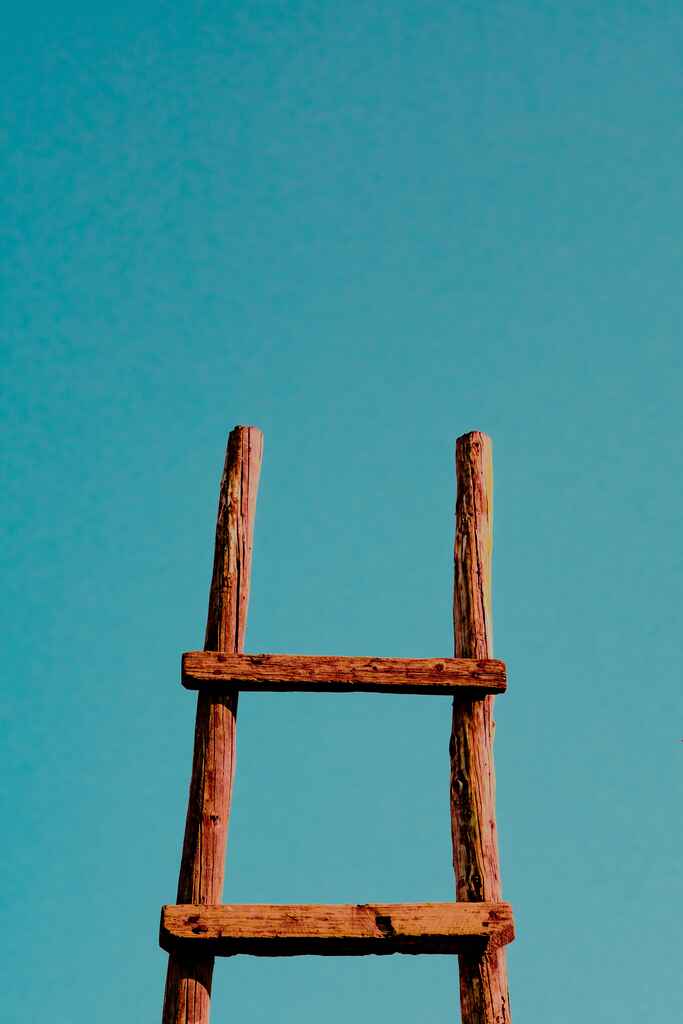
Getting to senior editorial positions
For editors, there are roughly two levels of seniority: after working as an assistant editor, you’ll first become a production, acquisition, or commissioning editor; then, you may go on to an executive or more senior position, like managing.
According to former HarperCollins editor Dominic Wakeford, “a commissioning editor is a project manager who oversees all aspects of the publishing process, collaborating with other departments (e.g. sales, marketing, publicity) to bring an author’s work to the widest and most engaged readership possible.”
The more experience you have, the more projects you manage. You can also take a more proactive approach by “identifying gaps in the imprint’s publishing programme and commissioning in specific areas to address that gap.”
Regarding even more senior positions, former Harlequin executive editor Mary-Theresa Hussey says: “Executive editors often work with important authors for the imprint while also digging deeper into overall publishing goals. They look at the direction of the imprint.” Since they deal with big-picture strategy, executives have to regularly answer questions like:
- How many top/best-selling authors were there this month?
- Is there room for a debut author?
- Are the books (and their plots/covers/themes) coming up this quarter too similar?
- Will they be printed on time?
So how can you get these senior roles? Opportunities usually come with time, but here are a couple of things that you can do to move your career upwards and onwards.
Tip #1: Look out for authors to acquire early on 🔍
Once you’re confident with the duties of a junior editor, you can begin branching out to acquisition. Mary-Theresa advises you to “pay attention to what is being pitched in editorial meetings, what makes it through, what doesn't, and which authors are consistent sellers. Keep an eye out on Twitter and blogs to find authors of your own — authors who fit the house’s criteria but also offer something new, fresh, and fun!”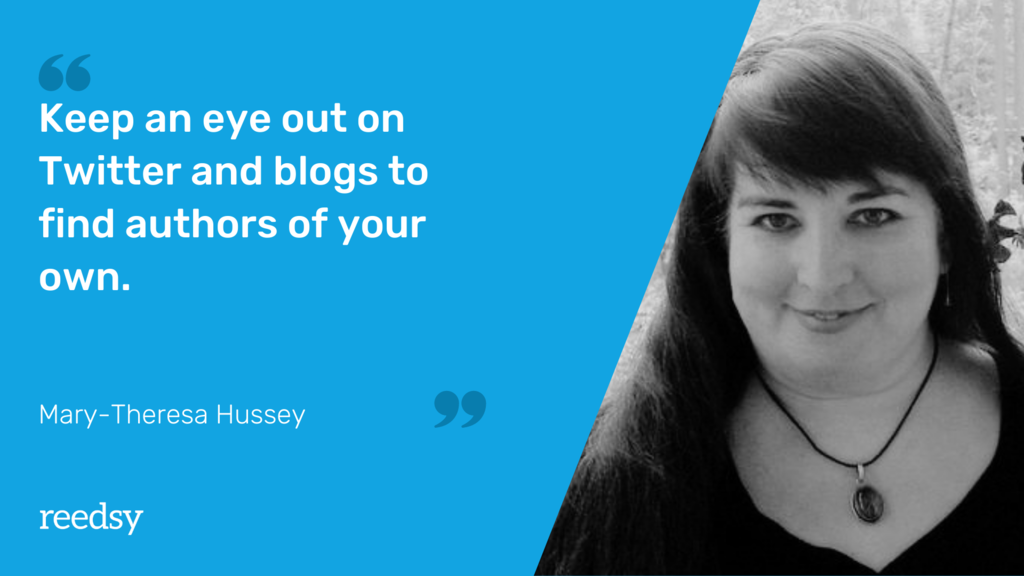 On Twitter there are plenty of pitching events where authors tweet an elevator pitch of their book to attract agents and editors. It’s worth following pitching events that interest you to find authors and agents to connect with.
On Twitter there are plenty of pitching events where authors tweet an elevator pitch of their book to attract agents and editors. It’s worth following pitching events that interest you to find authors and agents to connect with.
Tip #2: Be pragmatic about new jobs 🎯
The thing about the publishing industry is that there are only so many managing roles in a house or imprint, so you’ll often have to wait for someone to leave to get your chance.
As such, Dominic recommends being open to opportunities elsewhere, both in terms of your workplace and in terms of your specialty. “If a more senior job that isn’t your dream role comes up (for instance, it’s a commercial fiction job when your passion is literary), but there’s a good opportunity to learn the ropes and build some connections, then go for it! Very few editors end up working solely on books they might read for pleasure — but that’s not to say they don’t love collaborating with their authors.”
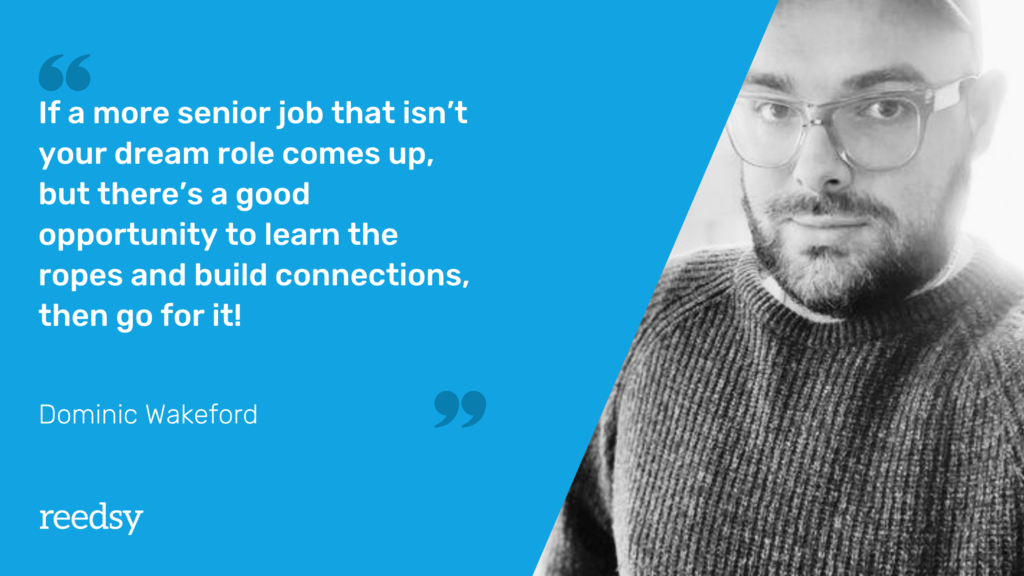
Moving up as a designer
For design, if you work in commercial fiction, you may be promoted to senior designer — someone who overlooks the house’s overall aesthetic and style. You’ll work on administrative tasks like hiring designers and typesetters for each project alongside brainstorming new book covers with the team.
For image-based genres, like cookbooks and children’s books, you can advance to art directing. In this role, you create briefs for projects, contract photographers and stylists, coordinate creative production, and play the main role in assembling the final product.
As a cookbook art director for Bloomsbury Absolute, Marie O’Shepherd managed several book projects at once, averaging 10 or more a year. She says: “Art directing includes supporting the author or stylist with their planning, prop-sourcing, and styling — essentially letting the creative team be their talented selves while ensuring the overall look and feel of the book matches the outlined vision. I pride myself in fostering creativity as opposed to forcing it, and this starts with forging great and genuine creative relationships.”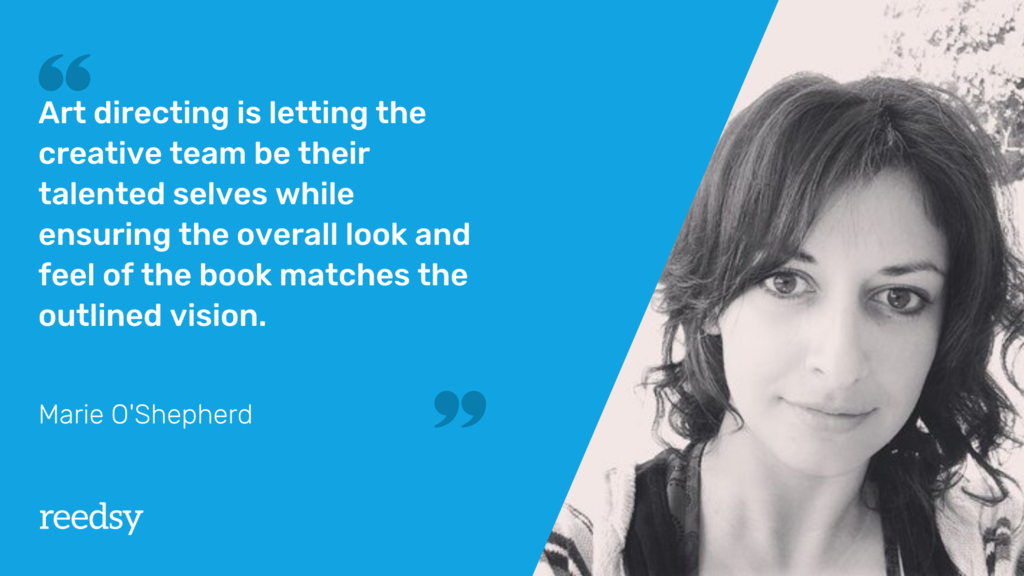
Tip: Gain creative and leadership experience ⚖
To become a senior designer or art director, you need both artistic abilities and leadership skills. This combo often allows for more flexibility when it comes to career progression.
Marie, whose background wasn’t actually in book design, shares: “I had a lot of experience in other fields before coming to design. I was a teacher for many years, and it gave me such strong leadership skills that becoming an art director felt quite natural. I got a postgraduate diploma in Graphic Design and started from the bottom at 29, but with all my prior experience, I rose quickly.”
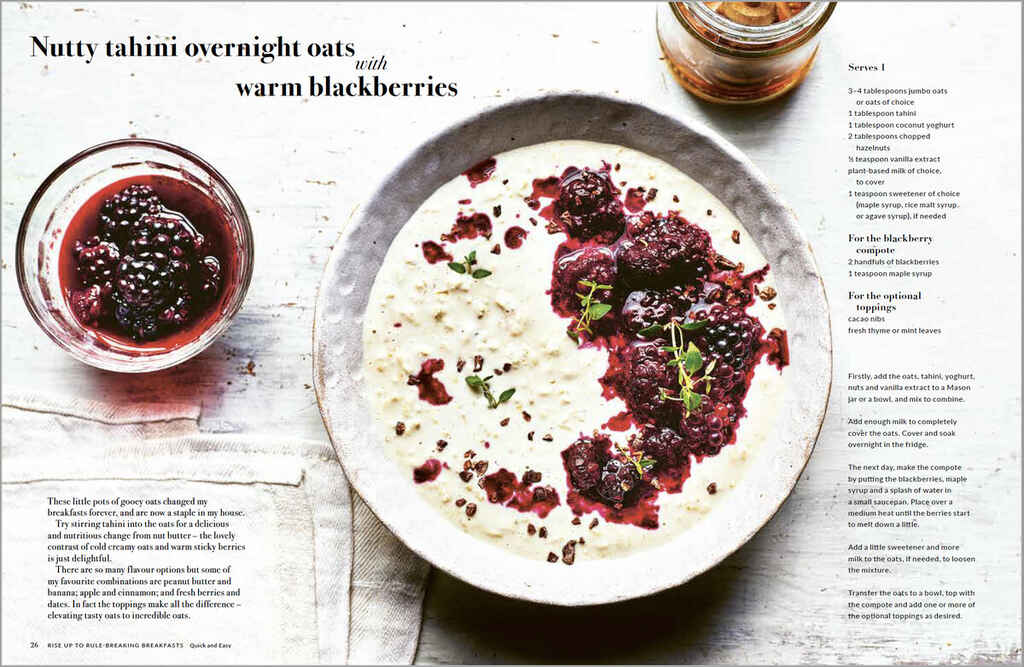
If you think you’re more suited to marketing, we have another post focused on book marketing jobs and senior responsibilities associated with them.
Moving between in-house and freelance
In-house and freelance work in the publishing sector aren’t as clearly separated as one might think. There are plenty of tasks the presses outsource to freelancers to keep production lean. Common freelance gigs that publishers dole out include copy editing, proofreading, certain design projects like photography or book covers, and marketing tasks like web designing. Even while you’re working in-house, you can (and many publishing professionals do) pick up freelance work on the side. Many professionals make the leap from employment to self-employment, especially later in their careers. Let’s find out why.
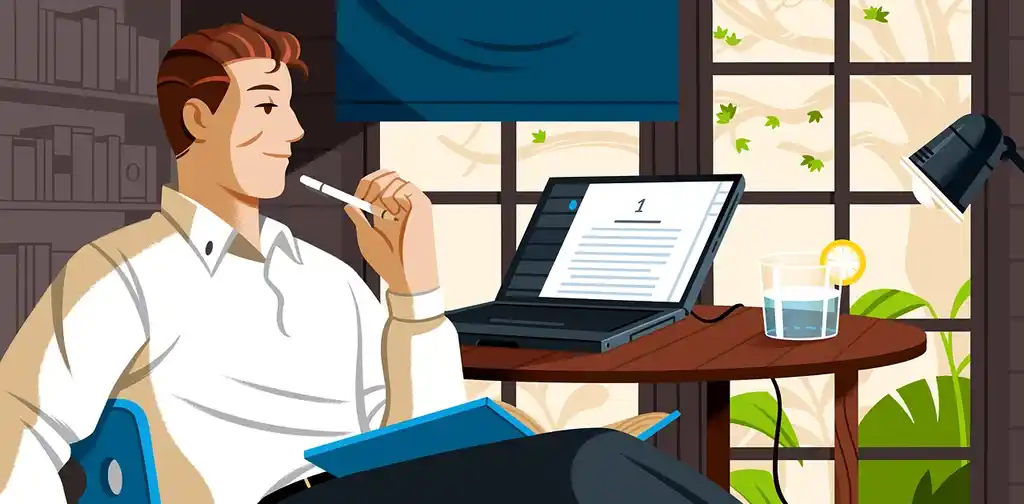
FREE RESOURCE
The Full-Time Freelancer's Checklist
Get our guide to financial and logistical planning. Then, claim your independence.
Freelancing can offer a return to creative work
In-house employment includes plenty of administrative work, which takes away time from creative work. Higher up the chain of command, you’d be in charge of a whole team and the company's growth, so you’d have much less time for tasks that might’ve been your passion in the first place.
Freelancers, on the other hand, usually get more time to focus on the creative aspects of their career. Book designer Andy Meaden chose to go freelance for this exact reason: “I no longer enjoyed the in-house position. I became a Design Manager and was doing less design and more bureaucratic work.”
Greater opportunities for development
For some, freelancing is a better alternative for their publishing career than staying in house. Such was the case with copy editor Nancy Tan:
“My reason for leaving a nine-to-five in 2011 to freelance was partly financial and partly the fact that middle management was populated with women, and anything higher by men.” The chances for more inclusive projects and career advancement seemed limited at the time. “Things have changed in the last decade: I’ve received a lot more projects from the big publishing houses in the past year by Black and AAPI authors,” she says, “but I fear a lot of it is cosmetic.”
Self-employment, on the other hand, allows a professional more freedom to choose projects they love, collaborate with authors from more diverse backgrounds, and focus on developing skills in their preferred niche.
Freelancers can provide a good, steady income
It’s a common concern that freelancing won’t pay the bills. We won’t deny that there can be dry spells, but as the 3,500+ industry experts on Reedsy will tell you, the job pool is far from shallow (especially if you have a strong professional portfolio, a good network, and a strong work ethic).
Alice Sullivan took a chance with her move to independent work, and it paid off: “After six years working in-house, I decided I was burned out and needed a change. So I saved my money, let my connections know I was making the jump to freelancing, and quit a very lucrative salaried position.
“Since then, I've revamped my website twice, made even more connections, and been able to specialize in what I truly love — ghostwriting memoir and personal development. I've also more than quadrupled my ‘very lucrative corporate salary.’”
Alice is not alone. In 2019, we conducted a survey of 200 editors and designers on Reedsy and found that 53% of professionals were able to earn at least as much or more than in-house employment through freelancing (and many of those who didn’t earn as much were only freelancing part-time). Combine that with the ability to live outside of big, expensive cities like NYC or London and you have a pretty strong reason to make the change.

The key is to set rates that reflect your expertise and list your services on reputable marketplaces, like Reedsy’s — that way, you’ll be in contact with serious authors who understand the importance of working with the right publishing professionals.
At the end of the day, working in publishing is all about pitching in to produce books that resonate with readers as much as they did with you. As long as you keep an open mind and actively work towards that goal, you will find your place in this industry.

